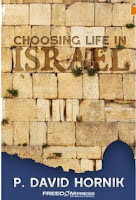As Hornik notes in his preface, the book covers various issues of Israeli concerns::
This book, then, deals with a decade of major Israeli political-security issues including: the Second Intifada, the disengagement form Gaza, the delegitimization campaign against Israel in its varied manifestations, the Second Lebanon War, ongoing terror from Gaza and war in Gaza controversial prisoner deals, the Turkish flotilla incident, the mounting Iranian threat, and tensions with the Obama administration.While I have have read a number of Hornik's articles, and blogged about them, I knew nothing about him. Part I of his book, Living in Israel, is more personal, and besides getting a view of how Hornik feels about Israel, there are aspects of his life that come through as well. In Long Journey to Now, we learn not only about "Kitty", but also that Hornik was born in the US, and that Israeli politics was not his first love:
Though already interested in politics, I was more into poetry and loved the nature passages in Wordsworth and Whitman. I would have considered it blasphemy to read a newspaper at such an hour, at least deferring all that grayness to the profane time of the workday.Hornik begins with Mistaken Random Terror in Jerusalem, about George Khoury, who was killed by Palestinian terrorists, who then turned around and apologized to his father when they discovered they had killed an Arab instead of a Jew -- and he continues with Peace in the High Places, about his first trip to the Temple Mount.
But politics came after me. There was too much news from Israel for me to live peacefully in upstate New York. What was I doing, reading Faulkner, writing short stories that seemed to be in an American tradition, while “my people” were under siege over there? It seemed I was living in two worlds. One I associated more with land, greenery, and artistic creativity, the other more with moral intensity. But if I opted for the latter, what would happen to the former? What would happen to me as a writer if I left my linguistic and cultural roots behind for a little, distant place that called to me mainly from the pages of newspapers and political magazines?
The second, longer, part of his book is entitled Israel's Struggle to Survive, starting with a piece with the title Intifada:
By November 1947, when the United Nations voted on whether to establish a Jewish (and an Arab) state in Western Palestine, the Jewish people had recently accumulated an impressive number of death credits—about six million of them.No influences of Wordsworth or Whitman here.
...In the last three years, during what is known as the Al-Aksa Intifada, the death-credit syndrome has come back to haunt Israel with special intensity. The numbers, of course, are much more modest—in the dozens or hundreds rather than millions.
Compared to the German fascists, the Islamic terrorists have harder work to do because the Jewish community they are trying to annihilate is armed. But the principle is similar.
Israel absorbs blows, letting its citizens be picked off and murdered, until a particularly large and grisly attack gives it enough death credits that it believes the world—and particularly the Bush administration—will tolerate its taking military action.
It is well worth reading P. David Hornik, for the topics he covers and for the illuminating and occasionally cynical insights he offers -- and here you have a wide ranging assortment of his articles all in one place.
-----
If you found this post interesting or informative, please  it below. Thanks!
it below. Thanks!
 it below. Thanks!
it below. Thanks! 

No comments:
Post a Comment